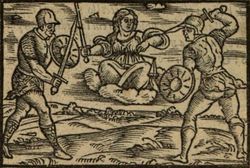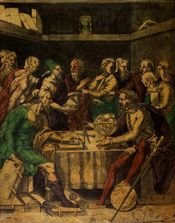|
|
You are not currently logged in. Are you accessing the unsecure (http) portal? Click here to switch to the secure portal. |
Difference between revisions of "Antonio Manciolino"
| Line 145: | Line 145: | ||
[[Category:Double Side Swords]] | [[Category:Double Side Swords]] | ||
| + | [[Category:Pole Weapons]] | ||
[[Category:Side Sword]] | [[Category:Side Sword]] | ||
[[Category:Sword and Buckler]] | [[Category:Sword and Buckler]] | ||
Revision as of 01:02, 26 April 2014
| Antonio Manciolino | |
|---|---|
 Illustration from the title page of Manciolino's treatise | |
| Born | late 1400s? |
| Died | after 1531 |
| Occupation | Fencing master |
| Citizenship | Bolognese |
| Patron | Don Luisi de Cordoba |
| Movement | Dardi School |
| Influences | |
| Genres | Fencing manual |
| Language | Italian |
| Notable work(s) | Opera Nova (1531) |
| First printed english edition |
Leoni 2010 |
| Concordance by | Michael Chidester |
Antonio Manciolino was a 16th century Italian fencing master. Little is known about this master's life; he seems to have been Bolognese by birth and he is thought to have been a student of Guido Antonio di Luca,[citation needed] the master who also taught Achille Marozzo. His fencing manual is dedicated to Don Luisi de Cordoba, Duke of Sessa, Orator of the Most Serene Emperor to Adrian VI; this dedication may indicate that Manciolino was attached as fencing master to the ducal court.
In 1531, Manciolino published a treatise on swordsmanship called Opera Nova ("A New Work"),[1] which is the oldest extant treatise in the Dardi or "Bolognese" school of swordsmanship.[2] The 1531 edition describes itself as "corrected and revised" and was probably based on an earlier version printed in ca. 1523; this date is based on the fact that Don Luisi de Cordoba was only orator to Adrian VI between September of 1522 and September of 1523.[3] Despite the breadth and detail of his work, Manciolino's efforts were overshadowed by the release of Marozzo's even more extensive work on Bolognese fencing thirteen years later.
Contents
Treatise
Main article: Antonio Manciolino/Introduction
|
Main article: Antonio Manciolino/First Book
|
Main article: Antonio Manciolino/Second Book
|
Main article: Antonio Manciolino/Third Book
|
Main article: Antonio Manciolino/Fourth Book
|
Main article: Antonio Manciolino/Fifth Book
|
Main article: Antonio Manciolino/Sixth Book
|
Additional Resources
- Leoni, Tommasso. The Complete Renaissance Swordsman: Antonio Manciolino’s Opera Nova (1531). Wheaton, IL: Freelance Academy Press, 2010. ISBN 978-0-9825911-3-0
- Manciolino, Antonio. Antonio Manciolino's 1531 Treatise on Bolognese Swordsmanship. Ed. Steven Reich. Lulu Press, 2009.
- Manciolino, Antonio (in Italian). Opera Nova di Antonio Manciolino (1531). Ed. Marco Rubboli and Alessandro Battistini. Rome: Il Cerchio Iniziative Editoriali, 2008. ISBN 978-88-8474-176-9
References
- ↑ The full title was Di Antonio Manciolino Bolognese opera noua, doue li sono tutti li documenti & uantaggi che si ponno ha uere nel mestier de l’armi d’ogni sorte nouamente corretta & stampata, which translates to "New Work by Antonio Manciolino, Bolognese, wherein are all the instructions and advantages that are to be had in the practice of arms of every sort; newly corrected and printed".
- ↑ Both Dardi and Luca are thought to have published treatises in the 15th century that have since been lost.
- ↑ Leoni, Tommasso. The Complete Renaissance Swordsman: Antonio Manciolino’s Opera Nova (1531). Wheaton, IL: Freelance Academy Press, 2010. pp 11-12.

